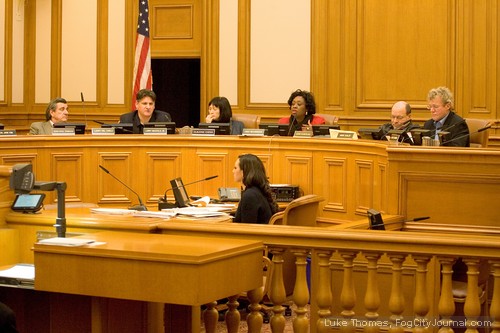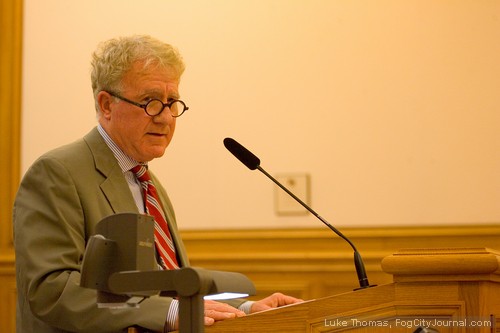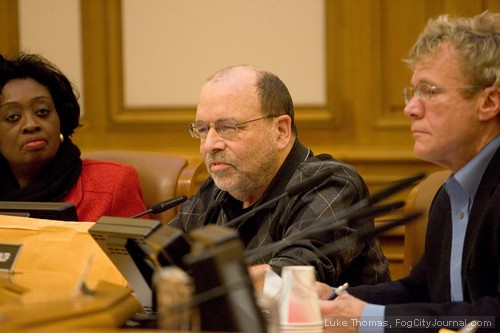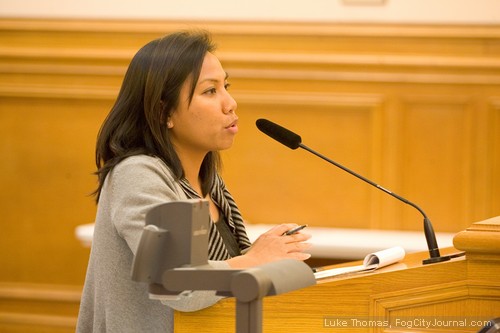
The Treasure Island Development Authority is a commission comprised of 7 mayoral appointees. It convened a meeting last week to review residents' concerns over a new rental agreement. Photos by Luke Thomas.
By Kat Anderson
February 14, 2012
The Treasure Island Development Authority (the City’s entity that oversees Treasure and Yerba Buena Islands) on Wednesday offered information and took public comment to clarify and allay residents’ concerns about a new rental agreement that property manager John Stewart Company mailed out to over 500 residents last December.
Residents had been upset by John Stewart Company actions that they saw as bad faith. Things had gotten off on the wrong foot when John Stewart Company informed TI tenants that if they did not agree to the December “Addendum” – a 27 page document that is longer than the original rental agreement – they would be evicted. Naturally, that got several residents curious about what land mines might be buried in the Addendum, and the rush to scrutinize the new document began.
Lo and behold, dedicated and sleuthy Treasure Island tenants discovered that their property manager had streamlined certain provisions that essentially deleted long-standing “just cause eviction” provisions, modeled after protections that exist in the San Francisco Rent Stabilization and Arbitration Ordinance. When said residents questioned John Stewart Company Assistant Vice President Edward (Ned) York about this, he informed them that Treasure Island, a state-created entity, was not beholden to San Francisco laws that give tenants broad protections; rather, more relaxed standards according to State law are the rule.

John Stewart Company Vice President Edward York.
This did not sit well with many of the residents on hand at this first informational meeting, and things got a little heated. Mr. York attempted to quell residents’ concerns by assuring them that there was no intention to take away rights or threaten any benefits that might be owed to original tenants according to Transition Housing Rules and Regulations. But, emotions were running high and good will had not been established.
Some residents at the meeting with John Stewart Company felt that the representatives had been condescending and unwilling to take their concerns seriously. Some residents also began to fear that their benefits, as affordable housing tenants, were going to be diminished or taken away, ostensibly to make it easier for the developer to get rid of them and replace them with market-rate tenants.
“It was upsetting to us to work so hard as a community to get to a point to get this development plan passed, and to have the John Stewart Company condescend to us and give us the message that if we didn’t sign, we’d be evicted,” said Becky Hogue, resident and elected member of the TI Citizens’ Advisory Board following the hearing at City Hall. “People do feel that they [John Stewart Company] want to get rid of those of us that have been there, the pre-DDA people.”
“DDA” stands for Disposition and Development Agreement, which is the contract between the Treasure Island Development Authority and Treasure Island Community Development, LLC. It became effective on July 14, 2011. Treasure Island residents who went through a qualification process and were deemed “eligible households” before July 14, 2011, are considered “pre-DDA,” and retain all the rights and benefits to which they are entitled under the Transition Housing Rules and Regulations.
So, in the TIDA meeting last Wednesday, Michael Tymoff, Director of the Treasure Island Development Project in the Mayor’s Office of Economic and Workforce Development, gave more background information to explain the chronology of events that have occurred in order to prepare Treasure and Yerba Buena Islands for the upcoming development by Lennar Corporation. He also explained that no policy changes were going to occur with respect to pre-DDA tenants and the benefits to which they are entitled as households eligible for transition benefits as affordable housing tenants.

Treasure Island Development Project Director Michael Tymoff.
Ned York went on to explain that even though State law ruled, the John Stewart Company was going to restore the “just cause” eviction provisions to the revised rental agreement, because the “spirit of the law” was being followed any way. He also stated that the deadline for reviewing the revised rental agreement was going to be extended to the end of March. There would be two more public information meetings, a final revised rental agreement would be distributed to residents on March 1, and the residents would have until March 30 to sign the documents.
“We’re going to continue to work with the residents and we’re going to go the extra mile. We’re going to have the public community presentations and we will hopefully get through the process at the end of March, beginning of April,” York assured FCJ following the TIDA hearing.
“Many of us were surprised to see other [property] management items rolled into this,” said Commissioner John Elberling in response to a claim from a John Stewart Company representative that the addendum to the tenants’ existing rental contract reflected “operational and managerial changes,” rather than “policy” changes.

TIDA Commissioner John Elberling.
Linda Richardson, President of TIDA, stated, “Supervisor Jane Kim and her staff are working to be sure your concerns are addressed. She takes very seriously any issue that concerns the residents. You will have representation. . .You have ears and eyes on this board as well as your supervisor.”
April Veneracion from Supervisor Kim’s office said, “We have heard and received your letters and attended the January 28 resident meeting. We have heard concerns regarding the timing of the lease addendum, and we acknowledge that John Stewart Company has extended the deadline to March 1 to accommodate two additional public information meetings.”

Aide to District 6 Supervisor Jane Kim, April Veneracion.
President Richardson reiterated, “TIDA [has] a policy in place to ensure that nothing is changing the tenant benefits. What we are talking about is administrative. . .We want to hear your issues. We are here to correct misinformation.”

TIDA Commission President Linda Richardson.
Public commenters and commissioners alike complained that it was difficult to evaluate what changes the John Stewart Company had made to the original addendum to the rental agreement because they had been provided only the revised addendum with no inclusion of the standard “strike out” notes that people are accustomed to having at their disposal when working with draft documents. FCJ asked York if he will make available to the residents what changes have been made in the final addendum rental agreement.
“We will, in all likelihood, mail them out before [the next community meeting],” York responded.
By the end of the hearing, several tenants expressed appreciation for the support they received from the commission as well as involvement on behalf of tenants by the office of District 6 Supervisor Jane Kim.
Hogue said she felt “positive after hearing how the Board feels.”
“It was nice to hear the Commission is on our side,” said Hogue. “I spent a lot of time working on the plan getting it passed and I would hate to see all of our hard work be torn apart by these new leases.”


 The Hunger Site
The Hunger Site
March 11, 2012 at 3:24 pm
Thanks for writing on the concerns of nearly a thousand San Francisco residents’ about their rights to affordable housing. Coverage of this issue, and the TIDA Board Meeting(s) in particular, is helping to push this matter toward a just resolution.
Looking at the big picture, the massively expensive development of Treasure Island begs for more oversight of the corporate and government partnership which has ruled here for nearly a decade– a partnership that often seems to operate in the shadows, beyond accountability. It is hard to figure out the public benefits versus the public risk of such a complex project, and the more “sunlight” on this subject the better!
I do have a factual quibble and an editorial criticism:
First page,2nd paragraph–“longer”: the 27p. Addendum Re: is ten pages shorter than the Original Lease and 2010 Addendum, 37p.
York’s statement that ‘State law ruled’ was an unqualified and unsupported opinion, and his claim that ‘the “spirit of the law” was being followed anyway’, since the JSCo was “not beholden” to SF laws, is a misinterpretation of the language of the Original lease.
The 1999 Residential Lease for the Villages and the current lease, states that although the rents are set by government authority and these units are therefore excluded from the SF Rent Stabilization and Arbitration Ordinance, the Landlord (TIDA) agrees not only to “just cause” eviction protections, but also to abide by the Rent Board’s annual allowable rent increases for existing units.
Btw, the true “spirit of the law” has been formalized in the Transition Housing Rules and Regulations in Grievance Procedures, page 28, by the last Administrative remedy of a hearing by an Administrative Law Judge from the Rent Board to appeal an adverse housing benefit decision by the TIDA Director after the Relocation Appeals Board.
Appreciative Island Lifer